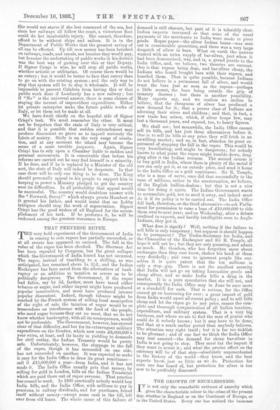THE ITALIAN CRISIS.
SIGNOR CRISPI has formed a Ministry. That is good news, for though he has plenty of faults as a statesman, he is the one man of whom it can be said that there is a fair chance of his being able to get the Italians out of their difficulties. Ile is energetic, he is resourceful, he is popular, and people believe in him, and these are the best qualifications for a statesman whose task is to induce his countrymen to make great sacrifices and to endure great burdens—to desist from doing the things they enjoy, and to begin doing the things they do not like. Let us state the problem before Signor Crispi, and then note down the things that tell both in his favour and against him. To begin with, he has to find some means for balancing the Budget. According to well- informed observers, Italy has for some time been spending every year ten millions more than she has received in taxation. Possibly this is an over-estimate ; but the fact remains that, in spite of a, great deal of " cooking," there has been a very large annual deficit. Now, either this must be stopped, or Italy be ruined ; and ruined not merely financially, but as a nation. But there are only three ways of making both ends meet—cutting down expenditure, increasing income, or a combination of these two. Signor Crispi has, there- fore, to ask his countrymen to endure the most dis- agreeable demands which a poor nation can possibly suffer. He cannot balance his Budget by merely cutting down expenses, or merely by new taxation. He will, therefore, have to do a little of both, and this will make him enemies in shoals, not only with the people who pay the taxes, but with the class, very numerous in Italy, among whom the taxes are spent. In a word, the problem before Signor Crispi is one of the most difficult ever presented to a statesman.
The things that tell in favour of the new Italian Premier succeeding in his attempt are fortunately not few. To begin with, the intelligent people of all shades of opinion have been forced by the events of the last few years to realise the perilous condition of the country. No one in Italy can pretend that there is no necessity for heroic measures. Again, the terrible ill-feeling expressed towards Italy by France makes the Italians as a nation understand. that they must put their finances on a firm footing. They know, or at any rate believe, that nothing would rejoice their great neighbour more, or more surely put them at the mercy of the French, than national bankruptcy. Every motive of self-preservation, as well as of pride, prompts them to get back to a position in which they can hold up their heads and escape from dependence upon financial powers and combinations controlled from Paris. Fortunately, too, Italy still retains unexhausted a great deal of the patriotic spirit which made the Italians of the last generation incur every sort of sacrifice for the good of the Fatherland. When we remember how first Turin and then Florence endured, almost without a murmur, to sink from capitals to provincial towns, we can realise that the Italian patriot is something more than a mere hater of the foreigner. If Signor Crispi can bring home to the people of Italy that unless they make the sacrifices he must ask them to make, they will undo the work of unification, the work that placed Italy amongst the great nations of Europe, and made the Italian race respected throughout the world, there can be little doubt that he will succeed in his task. At present Italy suffers from two things,—firstly, an overabundance of Government officials, and so a. terrible waste of her resources ; and secondly, from a laxity of fiscal administration so great that the actual yield of taxes is often not half what it should be. Here, then, is a safe line of retrenchment. It is easy enough to see how the employment of unnecessary officials grew up. In the first place, both the Austrians and the small paternal Governments of the Peninsula had made it their policy to keep up very large staffs of officials. To do so was to create supporters of the existing regime. But when the overthrow of the Austrians and the amalgamation of the small Governments took place, it seemed a wise thing under the circumstances not to be too economical. An- nouncing that there would be no dismissals oiled the wheels, and made the transfer easy and safe. But when once the opportunity offered by the overthrow of a Grand Duke or the withdrawal of a Viceroy had passed, it was exceedingly difficult to cut things down. No one anywhere, and least of all in Italy, cares to do that very unpopular thing—abolish comfortably paid posts. Again, the Italians as a people have a natural craving for the sweet security of Government employment. Many centuries of civilised life in cities have filled a large portion of the population with an intense hatred of making their own way. They like to feel that they belong to the great organisation of the State, and are, as it were, under protection. To the Italians may be applied the epigram .which was struck out of a common-place Saxon Chief-Secretary by the importunities of the place-hunters of Dublin,—" Every man in the country wants a place, and, when he's got it, wants his son appointed deputy." In his eagerness for a Government place, the Italian will be content with a minute salary, and hence the Government has been tempted by the cheapness of official labour to employ two men to do the work of one. The effect of the employment of a veritable army of poorly paid. men has been exactly what might have been expected. The administration has been inefficient, and nowhere more so than in the Revenue Department. Italians are not more dishonest than other people, but no- where in the world will you get men of the "respectable class" to collect money on labourers' wages without leakage. In Italy, by all accounts, the leakage is appal- ling. Now, if Signor Crispi is wise, he will treat these facts in one way, and one way only. He will relent- lessly, and without thought of who starves, cut down the number of officials. It is better that two or three thousand people should go to the wall than that the nation should suffer. Next, he should apply the maxim which was suggested by a wise adviser to a Board of Directors perplexed by the news that their general manager was stealing — " Raise his salary." Signor Crispi should see that the officials and Judges employed to carry out the Revenue-laws are put above all temptation to take bribes, and what is as important., are put in a position which will prevent them feeling that fear and awe of the rich man, which the very poor man finds it so difficult not to feel. Again, the revenue service should be inspired, not with the idea that it is for the best to over- look frauds against the Treasury committed by prominent men, but with the desire to catch as many big fish as possible. If one or two great landowners and financiers were mulcted, fined, and surcharged as they were by Pitt's tax-collectors at the beginning of the century, Italian taxation would be far more productive than it is now. Next to these opportunities for economy comes the expenditure on the Army and. Navy. It is probable, in the case of the Army, that a good deal of saving might be accomplished without any serious loss of efficiency. Italy would probably be quite as safe from invasion as she is now, even if she were to decrease . her troops by two army corps. No doubt the Italian Army is a most valuable school of unity and conduct, and hence any reduction of its numbers is theoretically to be deprecated. A Neapolitan or Sicilian peasant enters it almost a savage, and returns to his village a civilised human being, able to read and write, possessing a sense of self-respect, and, best of all, an Italian. Still, even these advantages may be bought too dear, and no wise man should desire to maintain a larger army than is absolutely necessary for defence purposes. In the case of the Navy, the reduction may be less easy. Italy is all coast, and a navy is as necessary to her as it is to us. She would not starve if she lost command of the sea, but since her railways all follow the coast, a victorious fleet could do her incalculable injury. She cannot, therefore, afford to be without ships and sailors. It is in the Department of Public Works that the greatest saving of all can be effected. -Up till now money has been lavished on railways, roads, and canals, not because they would pay, but because the undertaking of public works in his district was the best way of gaining over this or that. Deputy. If Signor Crispi is wise, he will stop all public works, whether artistic or utilitarian. Of course there would be an outcry ; but it would be better to face that outcry than to go on with the existing system ; and the only way to stop that system will be to stop it wholesale. It will be impossible to prevent Calabria from having this or that public work done if Lombardy has a new railway ; but if "No" is the universal answer, there is some chance of staying the torrent of improvident expenditure. Either let private enterprise make the future public works of Italy, or let them not be made at all. We have dwelt chiefly on the hopeful side of Signor Crispi's task. We must remember the other. It must not be forgotten that the state of Italy is very critical, and that it is possible that sudden retrenchment may produce discontent so grave as to imperil seriously the fabric of society. Sicily is on the very verge of revolu- tion, and at any moment the island may become the scene of a most terrible jacquerie. Again, Signor Crispi has to rely upon a Chamber liable to sudden and personal movements. It is conceivable that before his reforms are carried out he may find himself in a minority. If he does, and if he is replaced by a Minister of the old sort, the state of Italy will indeed be desperate. In that case there will be only one thing to be done. The King should personally appeal to his people to support him in keeping in power a Ministry pledged to get the country over its difficulties. In all probability that appeal would be successful. The country would doubtless answer with the "Forward, Savoy!" which always greets Humbert as it greeted his father, and would insist that no Lobby intrigues should stop the work of regeneration. Signor Crispi has the good wishes of all England for the accom- plishment of his task. If he performs it, he will be reckoned among the greatest statesmen in Europe.











































 Previous page
Previous page